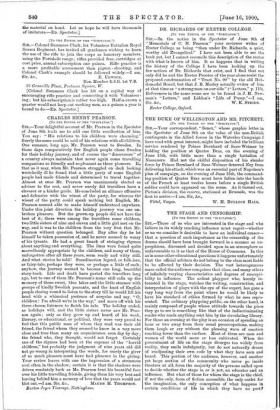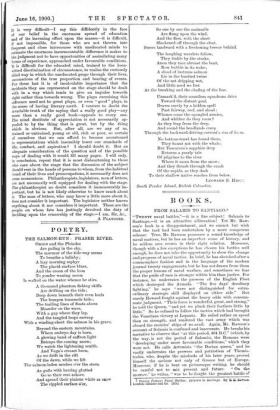THE STAGE AND CENSORSHIP.
[TO THS EDITOR OF THE "SPECTATOR."]
Sfn,—Those of us who are interested in the stage and who believe in its widely reaching influence must regret—whether or no we consider it desirable to have an individual censor— that a question of such importance as the censorship of the drama should have been brought forward in a manner so un- propitious, discussed and decided upon in an atmosphere so unfavourable to it as that of the House of Commons. In this as in some other educational questions it happens unfortunately that the official arbiters do not belong to the class most liable to be affected by their decision. The vast heterogeneous mass called the audience comprises that class, and many others of infinitely varying characteristics and degrees of suscepti- bility to influence. The ardent playgoer who, keenly in- terested in the stage, watches the writing, construction, and interpretation of plays with the eye of the expert, has gone a very long way from the point where he would be likely to have his standard of ethics formed by what he sees repre- sented. The ordinary playgoing public, on the other hand, is mainly composed of people whose attitude towards the piece they go to see is something like that of the indiscriminating reader who reads anything sent him by the circulating library. For these an evening at the play is an occasion of spending an hoar or two away from their usual preoccupations, making them laugh or cry without the pleasing *rave of emotion reaching lower than the surface. Most of them are men and women of the world more or less cultivated. When the presentment of life on the stage diverges too widely from reality, they smile indulgently, but do not naturally dream of readjusting their own code by what they have seen and heard. This portion of the audience, however, and another yet large section of the community who never go inside theatres at all, form the majority of the persons called upon to decide whether the stage is, or is not, an educator and an influence. But what of those for whom the stage is the chief, if not the only, form of fiction accessible, the only outlet for the imagination, the only conception of what happens in certain conditions of life in whieh they have no part P It is very difficult—I say this diffidently in the face of our belief in the enormous spread of education and of its leavening effect upon the masses—it is difficult, if not impossible, for those who are not thrown into frequent and close intercourse with uneducated minds to estimate the enormous insurmountable difference it makes to the judgment not to have opportunities of assimilating many forms of experience, approached under favourable conditions. It is difficult for the educated mind, trained to the keen- witted discrimination of circumstance, to realise the curiously Rind way in which the uneducated grope through their lives, anconscious of the true proportion and bearing of events. For these last it is of incalculable importance that the incidents they see represented on the stage should be dealt with in a way which tends to give an impulse towards right rather than towards wrong. The plays exercising this Influence need not be great plays, or even " good " plays, in the sense of having literary merit I venture to doubt the invariable truth of the saying that a really good play—any more than a really good book—appeals to every one. The mind destitute of appreciation is not necessarily ap- pealed to by the thing that is great, but by the thing which is obvious. But, after all, are we any of us, trained or untrained, young or old, rich or poor, so certain of ourselves that we can afford to become accustomed to representations which insensibly lower our standards of life, conduct, and aspiration ? I should doubt it. But an adequate consideration of the question and of the possible ways of dealing with it would fill many pages. I will only, in conclusion, repeat that it is most disheartening to those who care about the stage that the discussion of the subject -should rest in the hands of persons to whom, from the habitual trend of their lives and preoccupations, it necessarily does not 3eem momentous. Philanthropists, legislators, men of letters, are not necessarily well equipped for dealing with the stage. The philanthropist no doubt considers it immeasurably im- portant, but he is not likely otherwise to know much about it. The man of letters, who may know a little more about it, does not consider it important. The legislator neither knows anything about it nor considers it important. These are the people on whom fate has jestingly devolved the duty of deciding upon the censorship of the stage.—I am, Sir, &c., A PLAYGOER.







































 Previous page
Previous page